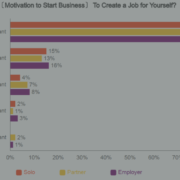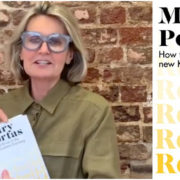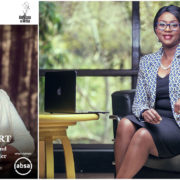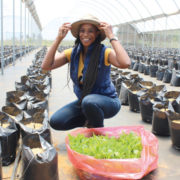Harnessing ADHD, OCD and Anxiety for Career Success — Lionesses of Africa

by Lisa Malek
Being diagnosed with Adult ADHD in my 30s was both bewildering and enlightening. Suddenly there was an explanation for my constant vacillation between distractibility and hyper-focus. My brain is always flailing about, struggling to hold onto one thought for more than a few seconds – while simultaneously clinging to unresolved problems and manifesting new ones. It’s like listening to 13 blaring soundtracks from 13 genres at once. Further aggravating my overwrought mind is an urge to obsessively over multi-task, a side-effect of working from home since lockdown.
Although I’ve always worked incredibly fast, I now find myself in a perpetual state of overdrive. I sprint through everything from strategizing, conceptualizing and executing to leading, mentoring and problem solving. Rationally, I know what takes priority but my brain refuses to cooperate, leading to moments of paralyzing overwhelm.
While I’ve thrived in my career – despite the debilitating effects of ADHD, OCD and anxiety – it’s been at a cost. And I am no longer willing to pay the price. But in order to break the cycle, I need to change years of entrenched behaviour, responses and rituals. This mammoth task is driven by two (fairly obvious) realizations:
How I want to feel at the end of the day.
Defeated and depleted or accomplished and satisfied?
If I change nothing, nothing will change.
Sounds so simple doesn’t it? But without conscious, decisive, disciplined action I will forever be ruled by my condition.
So, to ensure that I can escape the destructive loop of obsessive thinking, I have put into place the following counter-rituals (which I hope will help other women too):
1. I recognize the OCD and ADHD tricksters
These sly demons are fueled by fear and the illusion of control. They make you believe that by being in complete control, nothing will go wrong. It’s a lie, of course, because there is so much that is completely out of our control. Thus, micro-managing every situation with the aim of controlling the outcome, simply increases your anxiety.
2. I walk away, I breathe, I refocus, I return.
Getting up is the hardest part, as the tricksters want me glued to the screen to regain ‘control’. But every time I overcome the urge to stay, it gets a little easier. I find a brisk walk around the garden, a cuddle with the dogs or a 3-minute guided meditation are helpful tools to calm the mind, relax the body and return refreshed.
3. I ask myself: Is this bringing me closer to my higher purpose?
Preserving my precious and finite mental and emotional energy has become my priority. I want to dedicate my evenings to crafting my own novel and writing for my personal blog. I now carefully manage the distribution of my energy in the day, so I can pour more into my personal goals at night.
4. Zooming out to gain perspective
Magnification is just one of the many cognitive distortions that plague me. This manifests in focusing on a mistake and blowing it completely out of proportion. This is, however, the one entrenched behaviour that I’ve managed to quell most effectively. I do this by reminding myself of the ‘evidence’ from the past i.e., in my 10 years as a copywriter, no mistake has been big enough to tarnish my reputation or effect my career. If I focus on that, the mistake immediately comes into perspective.
To all the Lionesses forging ahead, while fighting a 24/7 internal battle, you have my utmost respect. Until we next meet, keep up the good fight – and please show yourself the kindness and compassion you deserve.
Good or Bad? — Lionesses of Africa

by Jess Mostert
Emotions. Two in particular – FEAR and LOVE. It is these that drive and influence every thought and direct every response. It is what makes us run- towards certain things, and away from others. It is these emotions that stop us from living our lives or force us to live our lives!
It is these emotions that make us feel so strongly: that pull us so strongly towards something or someone or that drive us away from the same scenario quicker than we can even control.
How many times do you think back on a situation or a decision, that now leaves you with regret, and ask yourself why you acted a certain way, or why you said what you said? Nine times out of ten, the answer will be because you acted in the moment – letting your emotions take the lead. You did something or said something because you felt scared, or simply because you felt love. Emotion-based decision making can be positive and lead to good things, but it can also be very toxic and lead to feelings of regret, anger, guilt and unhappiness. Like everything in life, it is important that our decisions are based on both emotion and logic; we need to have balanced decision-making skills.
Whether it’s dating someone who treats you horribly, or wasting money on something you can’t actually afford, your feelings can lead you astray if you’re not careful. Sometimes we let someone get away with too much in a relationship and when asked why, the answer is ‘because I love them’ or, ‘I’m scared I will lose them if I say something’… Maybe it means turning down a job opportunity out of fear that you think you will not be good enough. Whatever the scenario, if we simply act on emotion alone- it is not going to be good for our emotional well-being and self-development.
Heightened emotions, hazy decisions!
There is so much anxiety, uncertainty, and fear amongst us now. The fear of this Covid-19 disease itself; the fear of what it means for us, our families and our world; the fear of loss in all of its financial, emotional and physical forms. The world over has never needed to make such BIG and DRASTIC decisions, let alone in such a short period with very little knowledge. Let us try to make these decisions with mindfulness and balance- balancing our emotions with logic. When we are experiencing these emotions, it is easy for our judgement to become clouded and for our logic to disappear.
There have also been so many decisions and choices that are made purely from a place of love during this time; the generosity and kindness has been awe-inspiring to say the least. You don’t have to look far to see this.
How do we go about making decisions that are balanced?
Ideally, when making a decision, one should follow the following steps:
-
Identify the decision.
-
Gather relevant information.
-
Identify the alternatives.
-
Weigh the evidence.
-
Choose among alternatives.
-
Take action.
-
Review your decision.
Obviously, the time taken will depend on the magnitude of the choice and/or decision. This is obviously also a logical route to exploring your choices. All our decisions will come from an emotional state, we cannot turn this off- but balancing our emotions with reason and logic will help us to make GOOD emotional decisions rather than BAD emotional decisions. The difference? Taking time to properly identify your emotion, processing why you feel that way and choosing your better option.
This period has also taught us so much about our emotions. We all know what emotions are, and we feel them all day, every day- but how often do we THINK about them? This time has been perfect for people to spend time on themselves, becoming self-aware and navigating through emotions they have previously ignored. People have had time to identify their fears and hone in on their loves. It has allowed people to focus on those closest to them and to spend time doing the simple things in life- falling in love with the basics all over again.
Keeping it in the Family! — Lionesses of Africa

By Lionesses of Africa Operations Dept
We have had great feedback, support and excitement from our first research report produced in partnership with NYU, and in collaboration with ABSA, and of course with the incredible support of our >1.3 million membership. There are so many nuggets that one can take away from this, the South African Women Entrepreneurs Job Creators Survey (here), but the above chart, says it all. In a world where life is not equal, needs must and so we as Lionesses roll up our sleeves and start a business. As the business grows so we recognize that we are not just supporting local employment and through this the local community, but also our extended families. A hobby becomes a business with the arrival of paying customers. We are not quite sure when a start up becomes a Family Business, but we are certain of one thing, soon after the money starts to flow in, so does the family interest and with it the pressure mounts…
Considered by many to be the world’s greatest investor, Warren Buffet talks of family businesses as “The Lucky Sperm Club” and that is certainly true of one lucky recipient, Ana Botín, as she became chairman of Banco Santander (the 16th largest banking institution in the world) on the death of her father, the founder, in spite of ‘only’ owning 2% of the shares (Investors should have checked the small print!).
But it is not all luck. It is said that family businesses last on average 3 generations. The first generation works its bones off, toiling away to build the business and send their children to a University life they never had. The second generation flush from University bring all the new ideas and management theories to the business and take it to the next stage. The third generation, who up until this time have been at the racetrack spending their parents’ money, then arrive…
Sounds a bit unfair to the third generation, and terrible generalization it appears, but according to a study by John Ward, author of ‘Family Business Succession’ (here), 30% of firms survive through the second generation, 13% survive the third generation, and only 3% survive beyond that (that’s a load of days at the racetrack…). The saying being “From shirtsleeves to shirtsleeves in three generations”, so if you do break out from the third generation, you are doing extremely well.
So what are the problems? According to the Harvard Business Review (‘HBR’) here, there are three main issues.
Issue 1: “There’s always a place for you here.”
Indeed, who hasn’t heard that before…, but this in a strange way creates not a safety net, but an obligation in the children, which results in them joining but not really wanting to be there, or just as bad, it is treated as a ‘fall-back option’. Guess how either of those make your long serving, hard working middle management feel, when the Boss’ kid arrives…
To counter that, many family firms are now insisting that family members spend sometime gaining outside professional experience, having earned a university degree and apply like everyone else.
HBR continue: “At one European firm we know of, family members applying for a job must be at least 26 years old, have earned a master’s degree in business or engineering, speak three languages, and have won two promotions within five years at a non-family firm. And they are given only one opportunity to apply: If they’re turned down, they must go elsewhere.”
…that seems a bit excessive to us, but you get the idea. The ‘kid’ must really want this and she must bring something of serious value to the firm.
Issue 2: “The Business Can’t Grow Fast Enough to Support Everyone.”
Families grow and simple multiplication shows that having three children, each of whom have three kids, each of whom have three… That is a lot of Board Seats…and just one extra child makes a huge difference.
HBR points out that if you have already put into place the solution to Issue 1, this exponential rise in numbers sitting at the Directors’ Dinning Table, will disappear. If you haven’t put at least part of the solution into action yet, perhaps something to consider.
Issue 3: Family Members Remain in Silos According to Bloodline.
So the ‘kids’ follow in the parent’s footsteps, be it in finance, operations or marketing – this as HBR point out, fails “to gain the cross-functional expertise needed for executive leadership”, plus, seriously, who wants their parent to train them and pick up any faults, and which parent (when the child is now an adult) finds giving candid feedback easy. This creates a low learning curve and mistakes, errors and even biases are allowed far too much oxygen.
The solution HBR has seen has been for someone else to be the mentor, a non-family member – but for that to truly work there has to be an understanding that the mentor is safe from any family kickback (think Francis Ford Coppola’s ‘The Godfather.’ How would a mentor feel taking on any such role in that family business – now there’s a serious ‘hospital pass’ in more ways than one!) .
But what if the family business grows faster and further than the family expertise can handle? We previously looked at Kongo Gumi, Japan (here), founded in 578AD (yes!) that was originally a family owned and run business, until they started to recognize that ‘Kaizen’ or ‘continuous improvement’, central to their survival could only happen if they moved away from automatic family succession and pick on merit. Seems to have worked – still going strong 1,443 years later !
LEGO, one of the world’s best known family firms (see here) was founded in Denmark in 1932. The company has passed from father to son (one hopes that Daughters will get a look-in soon) and is now owned by Kjeld Kirk Kristiansen, a grandchild of the founder (and produces 75 Billion bricks a year, so clearly they have thrived!).
So the secret sauce to ‘keeping it in the family’? The answer perhaps lies in the word ‘owned’. That is not the same as ‘owned and managed’.
The current CEO of Lego?
Prior to joining the LEGO Group, Niels B. Christiansen was CEO of Danfoss A/S for nine years. Before that, he was CEO of GN Netcom and held leadership positions in GN Store Nord and Hilti Corporation in Switzerland. He began his career at McKinsey (not a bad CV!). With an M.B.A. from INSEAD and an M.Sc. in Engineering and BA from the Technical University of Denmark, he ticks all the technical skills boxes too! Interestingly, Niels is also a member of the Board of Tetra Laval Group, of Tetra Pak fame – the world’s largest food packaging company by sales. The company is privately owned by the family of Gad Rausing through the Swiss-based holding company Tetra Laval, – so another massive family firm. Again although owned by the Swedish founding family, this is run by an outsider, Adolfo Orive. Adolfo also has all the academic tick boxes covered, but here he started at the bottom after University (28 years ago) and worked his way up, first in sales. He then became MD in Colombia before finally becoming President and CEO of Tetra Pak global in 2019. If you are still wondering who Tetra Pak are – look at your milk carton – they invented the paper covered by a thin plastic sheen that keeps our milk or juice fresh and brings them in a cool €uro13 billion in annual sales.
So three absolutely huge family owned (but not run) companies, where the great families recognized they had to bring in a more professional leadership. The family business through this moves away from being a place that created employment for the founder and their immediate family, to ensuring that the growth and wealth created for the family is now both protected and secured through professionally run growth for the future.
But there is no requirement to bring in outside professional management, indeed far from it as there is no right or wrong – good news for those who wish to stay a family owned and run company, as HBR (here) confirm:
How to thrive in the new Kindness Economy by Mary Portas — Lionesses of Africa

Book Review
Since the pandemic, many businesses have gone under. But some are positively buoyant, despite the odds being stacked against them. Why is that? Retail and brand expert Mary Portas, author of Rebuild, provides a vital guide to how we reset post-pandemic and build back better.
Retail and brand expert Mary Portas argues that over the past thirty years the business of what we buy has been dominated by the biggest, fastest and cheapest. But those values no longer resonate. We’ve come to realize that more doesn’t equal better. How we live, buy and sell is changing. We are all ready to put people and planet before profit. The post-pandemic era is all about care, respect and understanding the implications of what we’re doing. This ‘Kindness Economy’ is a new value system where in order to thrive businesses must understand the fundamental role they play in the fabric of our lives. They need to add, not just grow, balancing commerce with social progress. Because we don’t just want to buy from brands – we want to buy into them.
Full of expert insight and invaluable advice, Rebuild is about resetting the dial. It gives businesspeople pause for thought about how to make money, as well as the practical tools to build back post-pandemic. And it speaks to anyone who votes with the pound in their pocket – all of us who, with social progress in mind, want to spend our money differently and better.
Author Quotes
The Kindness Economy is a movement for how consumer culture needs and wants to change. The landscape of how people buy, sell, make and live has to change. We need social progress to go hand in hand with commerce.
Even with its awful challenges, the coronavirus pandemic has brought a recognition of the important things in life – and business: community, value, creativity, and purpose. These will be our life rafts.
If we want to thrive in this world, then we all need to embrace the kind of change that the Kindness Economy offers, interpret it within our own lives and our own businesses, and be part of a force that will transform how we all live and buy.
About the author
Mary Portas is one of the UK’s most high-profile and innovative businesswomen. After making her name transforming Harvey Nichols into a global fashion destination, Mary launched Portas, her own creative company, with the mission to transform businesses into brands, places and spaces people want in their lives. Today her team work with clients ranging from Mercedes to Sainsbury’s. She has been a regular on our TV screens, advised the government on the future of high streets and developed a fashion label. Her proudest achievement to date is the creation of twenty-six Mary’s Living & Giving shops for Save the Children. She is the author of Shop Girl and Work Like a Woman.
Joanne Mwangi-Yelbert, a leading Kenyan marketing and communications industry leader — Lionesses of Africa

Lioness Weekender spoke to Joanne to find out more about her fascinating entrepreneurial journey and her vision for the future.
What does your company do?
We are an award winning and acclaimed 360°marketing and communications agency with years of experience, that takes your brand from conception to consumption; we take care of all your non-core brand alignment needs.
What inspired you to start your company?
I needed to pay bills and realized the gap in the communications sector was a niche I could fill. Over the years, the motivation has changed but the dream lives on. Today, I am inspired by the team and the brands we develop to become iconic.
What makes your business, service or product special?
We are a one stop shop marketing and communications agency with a proven track record of timely service delivery. We have dedicated high calibre service personnel. Using design thinking we empathize with our clients, recognize and enhance our role in their value chain to become their strategic partner.
Tell us a little about your team
Our 55 employee strong team embraces a culture of limitless possibilities with participatory performance management and career mapping. We are leveraging on the assets that we posses; from our strong management, iconic leadership and award winning experience in the market.
Share a little about your entrepreneurial journey. And, do you come from an entrepreneurial background?
An entrepreneur at heart and in practice, I love and am inspired by trail blazers, women trail blazers being her heroes. Titans that build wealth, live without limits, are true to themselves, hold high ideals and constantly aspire to greatness reinforce my conviction not to let anything stand in the way of my ambition, nor prevent me from giving back, in full measure, to society.
What are your future plans and aspirations for your company?
Continued growth as a Pan African business that nurtures brands to command the global market.
What gives you the most satisfaction being an entrepreneur?
Impacting lives through job creation, livelihoods, decent work and skills upgrading.
What’s the biggest piece of advice you can give to other women looking to start-up?
Get started now! There is no time like the present.
To find out more, contact Joanne Mwangi via email Joanne.Mwangi@pmsafrica.com or visit the PMS Group Africa Website: http://www.pmsafrica.com
Lioness Launch / South Africa’s knowledge wealth company, ThutoKhumo, launches new online training courses for entrepreneurs — Lionesses of Africa

Entrepreneur Sheila Baloyi, founder of ThutoKhumo, which means Knowledge Wealth in Setswana in South Africa, believes her coaching and development courses serve that purpose for both her clients and her organisation as a whole. As a sales leadership and management coaching practice, the company provides bespoke sales training courses for corporates, SMMEs and startups. This month sees the company announcing the launch of a series of new online courses, both for 2021 and going forward.
ThutoKhumo offers a diverse range of sales training programmes which are perfect for developing sales skills in a wide range of industries. For entrepreneurs who are looking to increase the value of their sales teams and help them to build and develop relationships with clients, ThutoKhumo is there to help. What makes the business different is that it helps companies humanize the process of selling their businesses with great impact and influence. ThutoKhumo partners with entrepreneurs, sales leaders, and sales professionals, to synergize the sales DNA of their organizations; to improve market opportunities; and to design strategies to grow sales and revenues, working with their teams to improve productivity and performance. Founder Sheila Baloyi says her business is dedicated to helping clients exceed their goals and build lasting and profitable relationships with their clients.
ThutoKhumo offers a range of services to clients including:
Sales Management Consulting
At ThutoKhumo Group Pty Ltd, Sheila and her team are proud to offer bespoke business consultancy services to suit their needs. The company is dedicated to helping its clients’ businesses succeed, whatever their size or industry. Sheila believes that bespoke, well-researched business consultancy can be the key difference between success and failure, profitability and loss.
Business/Sales Coaching
ThutoKhumo’s mission is to help clients to “level-up” their businesses with experience and valuable business coaching. Whether they are looking for specialist sales coaching, or company-wide business coaching, Sheila and her team help in eliminating waste and improving profitability. At ThutoKhumo, they are here for you. Business Coaching helps small, medium and large businesses of all kinds in a variety of ways. ThutoKhumo partners with clients to look at their business objectives, their strategies and goals, and help them to understand where their company is losing out. Sales coaching can help clients to improve their sales and marketing strategy, improve profitability and ensure they are marketing to the right audience. In addition to strategic advice, effective business coaching will also include practical advice and techniques to drive sales. Whether clients rely on traditional sales techniques, face-to-face meetings, cold-calling or digital/social selling, effective business coaching is essential.
Training for Corporates
Sales training courses provide people with the necessary skills they need to provide an exceptional customer service whilst maintaining a professional appearance. ThutoKhumo’s sales training courses can be made bespoke to ensure that they only provide the essential courses that will help staff to improve on the areas where they do not perform the best. ThutoKhumo is able to provide clients with a comprehensive sales training course designed to improve the areas in which teams do not perform well. The course includes sales training, marketing, leadership, performance management, telesales, communication.
Training for Entrepreneurs
Sales training courses provide people with the necessary skills they need to provide an exceptional customer service whilst maintaining a professional appearance. ThutoKhumo’s sales training courses can be made bespoke to ensure that they only provide the essential courses that will help staff improve on the areas where they do not perform the best. Courses are offered online or in-house. With a wide range of courses available, ThutoKhumo is able to provide clients with a comprehensive sales training course designed to improve the areas in which your team does not perform well. Programmes include Business Planning, C.A.R.E to Convert, Clarity to Clients, Branding, Communication, Digital Marketing.
New Ventures Launching
The ThutoKhumo team have been working on a number of new online courses which will be evergreen launches for the rest of the year and into the future. A Monthly Subscription Box for female entrepreneurs, goal getters, corporate girl boss and side hustlers is also being launched in September 2021, packed with tools, training and community to help clients to grow their businesses.
Courses will include :
1. Mini-course: Clarity to Clients
The Clarity to Clients course will enable service-based entrepreneurs to build their brands, clarify their ideal clients, development their niche and signature offers, and develop conversion funnels and sales systems.
2. Flagship Course: C-A-R-E to Convert:
The C-A-R-E to Convert course will help entrepreneurs master their Sales Mindset plus their Sales Process & Sales Strategy.
The Monthly Subscription Box:
ThutoKhumo is in the phase of creating a prototype for a monthly subscription business box for female entrepreneurs, goal getters, corporate girl boss and side hustlers.
The membership will include:
-
Membership hub packed with business resources
-
Guest expert trainings and masterclasses
-
Exclusive community of ambitious female entrepreneurs
-
Members-only events and opportunities
-
And a Monthly surprise box
What’s in the box?
-
Stationary, office supplies, tech gadgets and self care items
-
A planner to stay organized
-
A journal for your peak performance
-
Action items that will help you move your business forward
Sheila believes that what makes this new product offering different is that having gone through the lonely seasons of entrepreneurship, the clutter of not knowing which online course to take next, this subscription box will help clients to save time and money and be part of a community. She says: “Its curated with personal development and business growth books, tools and training. The best part of reading a good book is having someone to talk to about it and having someone holding you accountable to apply techniques that works. Each subscription gives you access to an exclusive Facebook Group where you can discuss the book of the month, free training and a community to do your market research.”
She adds, “You are your business’s most valuable asset. If you wanna save money and time invest in your personal development and business growth. Subscribe to a monthly business box and community that will take you to greater heights.”
There will be a VIP launch to everyone on ThutoKhumo’s email list. To join the email list and be part of the launch, email: sheila@thutokhumo.co.za. The rest of the launch events will be posted soon on all the ThutoKhumo social media pages. The aim is to launch with 100 subscriptions between July to September and reach 500 subscribers by the end of the year. The aim is also to create job opportunities and hire a full-time team of 10 in 2022. In addition, the aim is to also partner with female entrepreneurs who will be featured in the monthly boxes, authors and other entrepreneurs who want to reach more audience, and share their products and services to change lives. For the online courses, the aim is to impact 1000 students by the end of 2022 from all over the world.
For more information, contact Sheila via email: sheila@thutokhumo.co.za or call +27 64 686 7899
To find out more about ThutoKhumo Group Pty Ltd, visit the website http://www.thutokhumo.co.za or visit the company’s social media pages:
The Hidden Strengths of Learning and Succeeding at Your Own Pace — Lionesses of Africa

by Mbali Ndaba
A groundbreaking exploration of what it means to be a late bloomer in a culture obsessed with instant gratification, early success, and how finding one’s way later in life can be an advantage to long-term achievement and happiness.
Comparison is no measure of success, society at large places great comparison. From products to services to brands and to people, for late bloomers true success comes from operating in the fullness of their talents, abilities, and genuinely honed given gifts. It’s in the stretching, risking, and living in their own potential that comparison loses any and all meaning, and that their potential trumps their need to use other as the determining factor of their worth, and that means everything compared to.
If you want to fast-track your progress, stay perfectly still. The discipline of stillness can be rocket fuel to growth. It’s ironic that we start our life waiting in one place for nine months, only to be in a frantic hurry for the rest of our lives. We think that moving faster, thinking faster, acting faster, and being faster, things will happen faster. For today’s sojourner, slow is the new fast, calm is the new force, and peace is the new profitability.
In contrast to a twisted worldview, late blooming doesn’t mean stuckness – it actually means progress. Taking time to cultivate skill, and think through things thoroughly will create speed, efficiency, and better outcomes in all areas of life.
Vanessa Moungar, is new head of diversity & inclusion at LVMH Group
Vanessa Moungar, hitherto Director for Gender, Women & Civil Society at the African Development Bank (AfDB) has been appointed head of diversity and inclusion at the leading luxury brands group LVMH.
In her new role, Vanessa will help build a network of diversity and inclusion leaders in different regions; coordinate efforts at the group’s various brands, as well as oversee the global coordination of work on the issue of diversity.
Vanessa will work closely with all LVMH’s stakeholders and will build on a network of well-established Diversity and Inclusion (D & I) leaders in the regions, as well as strong initiatives in our Maisons, to oversee the global coordination of all D & I actions. Diversity and Inclusion are at the core of LVMH’s human resources priorities, the brand announced in a short statement.
She will work directly under Chantal Gaemperle, executive vice president of human resources and synergies at the luxury group, who said in about her appointment:
“Vanessa will bring her extensive experience to take our ambition in this field to the next level, and accelerate our efforts in continuously shaping a more diverse and inclusive culture at LVMH.” According to a post on Yahoo Finance News.
Since 2017, Vanessa was one of the pioneering women at the top of the AfDB as Director of Gender, Women and Civil Society. In this role, she drove one of the Bank’s key strategies the “Investing in Gender Equality for Africa’s Transformation” policy.
“After four extraordinary years at the African Development Bank Group, I am moving on to the next chapter, immensely grateful for the opportunity I had to serve the continent from such a unique platform…” Vanessa told wrote on her social media timeline.
During her tenure at the AfDB, she also oversaw flagship programmes such as the Affirmative Finance Action for Women in Africa (AFAWA) – which confronts the gender gap in access to finance, and aims at bridging the financing gap, in order to enhance African women’s entrepreneurial capacity.
She was also at the helm of Fashionomics Africa, an AfDB platform that supports the growth of African “Micro, Small and Medium-sized Enterprises (MSMEs) operating in the creative industries, notably the fashion, film and food value chain.”
While at the Bank Moungar was appointed to French president Emmanuel Macron’s Presidential Council for Africa – formed to advise him on France’s African policy.
Vanessa, 37, who hails from Chad and has French nationality,is the daughter of former Prime Minister of Fidèle Abdelkérim Moungar, and a staunch advocate of advancing the right sand empowerment of women and youth.
Don’t Give Up On Your Farming Dreams – Mbali Nwoko – African Farming
Mbali Nwoko, founder and CEO of The Green Terrace, persevered despite some serious setbacks. She says when you find something you love and are passionate about, you should not let anything stand in your way. African Farming caught up with her at her new farm in Bapsfontein near Pretoria.
Gauteng’s 2018 Agricultural Writers’ Association New Entrant into Commercial Farming winner and 702 Sage Small Business Awards finalist Mbali Nwoko could not be happier about going back to farming after a two year break.
This follows a series of hard knocks, including the passing of her husband and the impact of Covid-19 restrictions. But Mbali, 33, owner and CEO of The Green Terrace, says she draws strength from her experiences and is upbeat about her fresh start.
In late January, she planted the first crop of spinach and peppers on her new 2ha farm in Bapsfontein, southeast of Pretoria. She bought the farm in 2019 but did not develop it immediately for several reasons.
“It took some time to finalise the purchase, and I only got the title deed in February last year. My lawyer advised me not to start anything before I got my title deed,” Mbali explains. Then, just a month after she had taken title, the country went into hard lockdown.
“The next nine months was an incredibly stressful time for me. Money was really tight; investors were reluctant to lend money or else they put such heavy demands on loans that it wasn’t worth borrowing.”
The planned August planting date came and went, and the capital Mbali needed to put in electricity and the irrigation system was nowhere in sight. “I was literally stuck and thought I would have to sell.” But then she had a break, or as she puts it, “a godsend”.
“In December, a generous corporate advanced me an interest-free loan with easy repayment conditions.”
The corporate executives had looked at her history and her budget breakdown. Three weeks later they gave her the green light and she was able to put in her irrigation system. Going the hydroponic route to minimise risk, Mbali and her team are back on track with 1ha under 20 multispan tunnels, planted to 66 000 spinach plants and 33 000 pepper plants.
The Green Terrace will supply a mixed clientele, because Mbali believes it is important to keep a diverse client base. “But much of this crop is earmarked for Pick n Pay,” she says.

transition from planting
in soil to growing fresh
produce hydroponically
using sawdust as a
growing medium.
SETTING UP
Before she started farming, Mbali ran her own recruitment company hiring for South African-based multinationals and some local companies, including Eskom. Her business did well until 2015, when the South African economy took a nosedive.
“Companies started freezing positions and I took a knock,” Mbali says. Then her life took a new direction after she attended an entrepreneurial workshop in Johannesburg. That is where she met smallholder farmer Erick Mauwane of Oneo Farms, operating in De Deur outside Johannesburg.
“Chatting to Erick during the tea break, I quizzed him about his business. He told me he was farming cabbages and moving into pigs. He marketed his cabbages through several retailers, including Spar, in the Vaal area,” recalls Mbali.
As a township girl raised in Spruitview in the East Rand, Mbali says she had a limited understanding of agriculture – but she was fascinated by Erick’s story.
“I thought one needed lots of money, vast tracts of land and huge machines to farm. Farming, to me, was for white people,” she laughs.
Erick spoke to Mbali about smallholder farming and the possibilities of making it by starting small. “That night, I researched smallholder farming down to the finest details. I realised it was possible to make a decent living on less than five hectares.”
The Green Terrace was established a week later.

spinach and 33 000 pepper plants earmarked mainly
for Pick n Pay.
FINDING LAND
“I grew up on the East Rand and I’ve seen lots of farms travelling to and from home over the years. Searching the internet led me to Costa Farms, Plantation Farms and Gonzales Farms in Boksburg and surrounding areas,” Mbali says. She approached the managers of these concerns and asked them how she could start farming and whether they knew of available land she could rent.
“Although they could not help me with land, I got a few farming tips and referrals to other farmers.”
The first deal she secured went sour despite her having ordered 30 000 spinach, 40 000 cabbage and 16 000 green, yellow, and red pepper seedlings.
Fortunately, the second lease of a 14ha farm, which belonged to retired teacher Mama Beauty Aphane, went through.
“The farm had 8ha of arable land, with 10 tunnels and shade nets taking up 2ha,” explains Mbali. There was electricity, a borehole and a reservoir. At first, Mbali leased 2ha. In late January, Mbali and her team planted 66 000 spinach and 33 000 pepper plants earmarked mainly for Pick n Pay.
“I cleared the area and started with 30 000 spinach seedlings.” This deal was a sweet one. Mama Beauty gave Mbali the use of a tractor, a plough and irrigation equipment. She also had the benefit of a skilled labour force.
Before planting, Mbali arranged a soil test through the Agricultural Research Council (ARC). Spinach was one of several crops recommended by the ARC. A local fertiliser company advised her on agronomy as part of its aftercare service.
“I planted my first spinach crop on 11 July 2016, followed by cabbages and peppers in August and September,” Mbali recalls. Her determination and potential impressed Mama Beauty, who then offered her the use of the total farm acreage.
“Mama Beauty was exceedingly kind,” says Mbali.
“I was happy to take over the farm, and in the process I inherited some of the crops she had already planted in the tunnels and under shade nets.”

hectare under cover by the end of the year.
SECURING MARKETS
Mbali started attending farmer information days to broaden her knowledge and expand her network. At a farmers’ day organised by the Joburg Market, she met a senior representative of Food Lover’s Market (FLM).
As a former recruiter, Mbali was used to making the effort to spend time interacting with senior managers from various companies, so it was easy for her to approach the FLM rep and tell him her story.
“We exchanged contact details and the next day I followed up with an email. In no time we had arranged a farm visit from a senior buyer for the East Rand,” explains Mbali.
During this visit she learnt a lot about supplier requirements, such as refrigerated trucks and packhouses, for big chains like FLM. Although she did not meet all the criteria, FLM gave Mbali her first break and contracted her to deliver 300 bunches of spinach a day.
To help her meet its needs, the company introduced her to Solidaridad and the Lima Rural Development Foundation, two international enterprisedevelopment NGOs working in South Africa. Lima provided agronomy services to The Green Terrace twice a week.
For her surplus spinach crop and the cabbage and peppers soon to be harvested, Mbali had to make another plan. She began a market search campaign.
“I knocked on every retailer’s door on the East Rand, from family stores to franchises such as Spar, Shoprite and Pick n Pay,” she says.
Once more, her recruitment background came in handy. “I was not afraid to walk in and ask for a senior person who could help me. What’s the worst that could happen?
They’ll either say yes or no.” By the end of 2016 Mbali was supplying a few clients, mostly processors that chop, slice and dice for the restaurant market, as well as retailers such as Spar, Pick n Pay and FLM, and hawkers.
In the meantime she made some staff changes to the business, replacing older employees with younger people. “We had some employee clashes because the pace was different. My clients were demanding the best service on schedule, so my staff had to be on the ball all the time.”

the farm, there was
no infrastructure on
the land. Today it has
a reservoir, electricity
connections and staff
quarters, and she is
currently building
a packhouse.
THE POWER OF NETWORKING
Mbali began to attend conferences and workshops to get industry exposure. “In August 2017 I was introduced to the Produce Marketing Association (PMA) Fresh Conference by FLM, who paid for my first ticket.
This is an event that no serious fresh produce farmer should miss. I met captains of industry, from major retailers to CEOs, buyers, input suppliers – virtually everyone you’d want to meet and connect with as a producer.”
At the PMA Fresh Conference Mbali met Mike Coppin, one of the founders of FLM. However, she does caution against common conference pitfalls.
“Some of these events are just talk shops and time wasters.” Through farmer’s days, Mbali says, she’s connected with many brilliant farmers. One of them, Masedi Mohale, a commercial vegetable farmer in Limpopo, is now her mentor. Mbali also uses social media to connect with other farmers and suppliers.
“I’ve met Kobela Mokgohloa, a black commercial cucumber farmer in Pretoria on social media. Kobela has been giving me some cool advice since I’m now into hydroponics. South African farmers, black or white, young or old, are my heroes. The information and life lessons they are willing to share with fellow farmers are priceless,”Mbali emphasises.
On her farming journey so far, Mbali has learnt some hard lessons. After two weeks of continuous rain in December 2016, she and her team had to down tools.
“Then I made a huge mistake, thinking we could take a break since it was already midDecember.”
When they went back to work in January, everything was destroyed. “The crops in the tunnels were heavily infested with fungi; there were whiteflies and aphids on my peppers. The spinach in the fields had black spots.
My interest was mainly in sales and I did not have experience in intense crop management. I’d neglected technicalities, such as spraying, fertilising and rotation programmes.”
She says she learnt the hard way that farmers don’t take holidays. In January 2017 she had to start from scratch. “This time I planted baby marrows, green beans and spinach,” Mbali recalls.
She was doing well until February 2018, when disaster struck again and the electricity transformer blew up. Unable to irrigate for a few weeks, she suffered another crop failure. She started replanting and was putting a further 5ha of land into production when her husband fell gravely ill. He passed away in November 2018.
Mbali decided to take a break for a while to mourn and recover. She wound down the operation and found a tenant to take over while she took a break in 2019. That year she bought the 2ha plot in Bapsfontein, with a view to farm it when she felt ready to start again.

crops. Mbali says this makes it
especially useful for cash flow.
FUTURE PLANS
Despite delays, income loss and personal tragedy, Mbali says she is raring to go.
“I am pleased with my hydroponic system and the level of automation we have now. It’s different and it’s exciting and I want it functioning optimally.”
She says she doesn’t regret the stressful times because she learned valuable life and business lessons. She plans to erect more tunnels on her farm and is keen to explore export opportunities.
“I’d really like to expand my reach and I’m interested in the export market. We’re ideally placed for success.”











